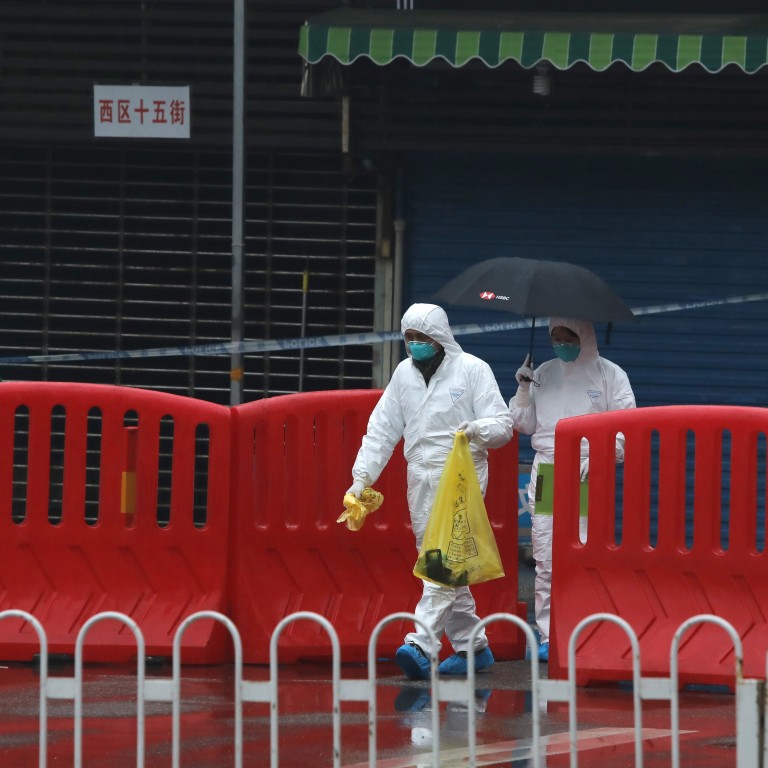
Coronavirus: WHO gears up for main mission into China to hunt for the origins of Covid-19
- WHO and Chinese experts have drafted terms of reference for probe into the epidemiology of early infections
- Investigators will examine the first cases identified in Wuhan to try to track the animal source of the virus
The team spent three weeks in meetings and video conferences with scientific counterparts in Beijing and Wuhan, where the virus was first identified late last year, the WHO said. The meeting enabled the WHO experts, who were not named, to understand the research that had already been done in China, including around the Wuhan seafood market linked to a number of early cases of Covid-19.
“As a result of these efforts, WHO and Chinese experts have drafted the terms of reference for the studies and programme of work for an international team, led by WHO,” director general Tedros Adhanom Ghebreyesus said.
Who will be on the team has not been decided, according to WHO Health Emergencies Programme executive director Mike Ryan. The time frame for the next mission was also not specified, although last month Ryan said assembling the team and sending them to China, where they must adhere to a quarantine period, would take a matter of weeks.
What has been agreed upon is the programme of work. Ryan said the main thrust of the international team's investigation would initially be epidemiology, or understanding the first infections to narrow down where scientists should look for the animal source of the novel coronavirus that causes Covid-19. Though the virus is thought to originate in bats, how it passed into humans and whether an intermediary animal was involved, remain unknown.
“There are gaps in the epidemiologic landscape and what is required is going to be a much more extensive retrospective epidemiologic study to look at those first cases and clusters in Wuhan,” Ryan said.
Coronavirus science latest: vaccines, treatments, reinfection and research
The international team will begin its work in Wuhan in Hubei province, but Ryan said the fact that the first cases had been identified in the city did not mean that was where the first human infections had occurred.
In-depth and detailed retrospective studies to understand the first known cases would allow the team to work backwards to examine “in a much more precise way” potential animal sources, Ryan said.
“Otherwise it’s like needles in a haystack, you can sample every animal in China and outside, but you might have no luck because you are guessing.”
Although Wuhan’s first Covid-19 patients listed in published reports date to the beginning of December, unpublished government data reported by the South China Morning Post showed cases were identified, likely retrospectively, in Hubei province as early as November 17.
Meanwhile, analyses of genome sequences of the virus published by international scientists in recent months have pegged its first crossover into humans to earlier in the autumn, with one study suggesting as early as September.
However, the hard evidence of the first person to be infected, the so-called patient zero, remains elusive, along with the animal carrier. The virus’ closest known relative was found on the other side of the country in a bat in southwestern Yunnan province.
If past outbreaks originating in animals are any guide, it can take years of investigation before scientists zero in on a region of origin or a human behaviour that may have precipitated the crossover. Pinpointing the exact moment a virus jumped species is often impossible.
That theory has been rejected by most specialists in the field, not least because the pathogen causing Covid-19 was unknown to science before it appeared in the first Wuhan patients.
Critics claim WHO was slow to act over coronavirus. Are they right?
Beijing has also pushed back on assertions that the virus originated in China, pointing out that it could have emerged elsewhere and was only first identified in Wuhan. A proper and thorough investigation by the WHO should include other countries as well, China officials have said.
On Friday, members of a WHO-convened meeting of the international health regulations emergency committee, urged the WHO to fast-track its investigation, which has been in the pipeline for several months.
Among committee recommendations to the WHO was a call to “accelerate research into remaining Sars-CoV-2 critical unknowns, such as the animal source and potential animal reservoirs”.

